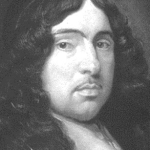Hark how the Mower Damon sung,
With love of Juliana stung!
While everything did seem to paint
The scene more fit for his complaint.
Like her fair eyes the day was fair,
But scorching like his am’rous care.
Sharp like his scythe his sorrow was,
And withered like his hopes the grass.
‘Oh what unusual heats are here,
Which thus our sunburned meadows sear!
The grasshopper its pipe gives o’er;
And hamstringed frogs can dance no more.
But in the brook the green frog wades;
And grasshoppers seek out the shades.
Only the snake, that kept within,
Now glitters in its second skin.
‘This heat the sun could never raise,
It from an higher beauty grow’th,
Which burns the fields and mower both:
Which mads the dog, and makes the sun
Hotter than his own Phaëton.
Not July causeth these extremes,
But Juliana’s scorching beams.
‘Tell me where I may pass the fires
Of the hot day, or hot desires.
To what cool cave shall I descend,
Or to what gelid fountain bend?
Alas! I look for ease in vain,
When remedies themselves complain.
No moisture but my tears do rest,
Nor cold but in her icy breast.
‘How long wilt thou, fair shepherdess,
Esteem me, and my presents less?
To thee the harmless snake I bring,
Disarmèd of its teeth and sting;
To thee chameleons, changing hue,
And oak leaves tipped with honey dew.
Yet thou, ungrateful, hast not sought
Nor what they are, nor who them brought.
‘I am the Mower Damon, known
Through all the meadows I have mown.
On me the morn her dew distills
Before her darling daffodils.
And, if at noon my toil me heat,
The sun himself licks off my sweat.
While, going home, the evening sweet
In cowslip-water bathes my feet.
‘What, though the piping shepherd stock
The plains with an unnumbered flock,
This scythe of mine discovers wide
More ground than all his sheep do hide.
With this the golden fleece I shear
Of all these closes every year.
And though in wool more poor than they,
Yet am I richer far in hay.
‘Nor am I so deformed to sight,
If in my scythe I lookèd right;
In which I see my picture done,
As in a crescent moon the sun.
The deathless fairies take me oft
To lead them in their dances soft:
And, when I tune myself to sing,
About me they contract their ring.
‘How happy might I still have mowed,
Had not Love here his thistles sowed!
But now I all the day complain,
Joining my labour to my pain;
And with my scythe cut down the grass,
Yet still my grief is where it was:
But, when the iron blunter grows,
Sighing, I whet my scythe and woes.’
While thus he threw his elbow round,
Depopulating all the ground,
And, with his whistling scythe, does cut
Each stroke between the earth and root,
The edgèd steel by careless chance
Did into his own ankle glance;
And there among the grass fell down,
By his own scythe, the Mower mown.
‘Alas!’ said he, ‘these hurts are slight
To those that die by love’s despite.
With shepherd’s-purse, and clown’s-all-heal,
The blood I staunch, and wound I seal.
Only for him no cure is found,
Whom Juliana’s eyes do wound.
’Tis death alone that this must do:
For Death thou art a Mower too.’

















Comment form: